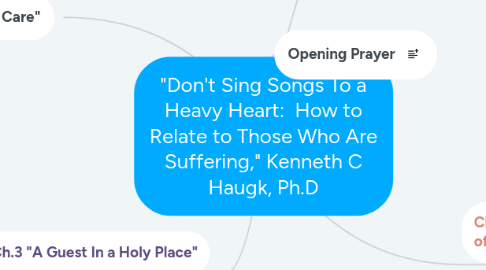
1. Ch.3 "A Guest In a Holy Place"
1.1. "When you offer care and comfort to another, you are stepping into a holy place, into the other person's unique universe of selfhood, need, and pain. It is holy because, when you enter in, you will find Jesus already there ahead of you--in that unique person. What a privilege!
1.1.1. "As w/homes, so it is with lives. Each hurting person is unique, each one an individual...As a guest in that private space, you should not attempt to redo the person's way of handling the situation to suit yourself."
1.1.1.1. "Your task is to understand and appreciate the uniqueness of the person in front of you."
1.1.1.1.1. "Each person is socially conditioned over many years and by many experiences. That conditioning affects how he or she responds to life crises and other events that lead to suffering. People with the same kind of illness will respond to it differently because of the way their early learning experiences influence their current perception of the situation."
2. Ch.1 "The Call to Care"
2.1. Assumption in the Open:
2.2. Story of Association President's wife dying of cancer:
2.2.1. Purpose of our Book Study:
2.2.1.1. Caregivers Greatest Difficulties Relating to Those Suffering
3. Introduction
3.1. Author shares from his own experience, "On a warm day in early August, my wife Joan was first diagnosed with ovarian cancer, confirmed the next day by an oncologist. For Joan it was the beginning of her 41-month fight for life (pg.9)."
3.2. Shel Silverstien's poem "Helping" defines two very different kinds of help:
3.3. 4,252 folks participated in research from perspective of both caregivers and those in depths of their own pain and suffering.
4. Ch.2 "A Biblical Understanding of Suffering"
4.1. Bible consists of family histories, national archives, letters, poetry, epic battles, love stories--a tapestry featuring a loving God who cares for REAL people!
4.1.1. Bible doesn't hide suffering, but portrays it realistically. Talks abut real people with real challenges, heartaches, and suffering
4.2. "Already & Not Yet"
4.2.1. Paul lays out whole pic of Xian life w/God--past, present, and future.
4.2.1.1. Context: Paul doesn't say "in this lifetime," that all will turn out all right. Doesn't even say all will make sense in this lifetime.
4.2.1.1.1. Paul was talking about the widest possible perspective of God's plans and purposes for humans and all creation. This ch. is God's eye view of life, not a narrow sliver.
4.3. N.T. never suggests that faith is insurance against suffering. Faith in Jesus isn't immunity from suffering.
4.3.1. Honesty: Paul wrote honestly about his life."My grace is sufficient for you, for my power is made perfect in weakness."
4.3.1.1. God does not cause the pain in Paul's life. Paul can be a deeper witness to God's love and hope through the pain, though. Paul is better able to share the love of X with others in a more genuine and empathic way because of the pain.
4.3.1.1.1. Key Takeaway:
4.4. Easter People: sound familiar?
4.4.1. Psalm 23.4
4.4.1.1. Comfort is the incomparable presence of God! Just as shepherd is with sheep, so God is with God's people.
4.4.1.1.1. "Aloneness is never so sharp as when someone is suffering. While God's presence can be a powerful antidote to loneliness, suffering people may have a difficult time believing God is with them. One gift you can offer is to be present in their pain. Physical presence of another can bring significant comfort to those suffering."
4.5. "God is with us as one who understands pain and suffering from personal experience."
4.5.1. Paul and comfort
4.5.1.1. A Bit of Greek
4.5.1.1.1. Suffering can cause us to question God's presence and care, but through our physical presence, those suffering can see and hear God.
4.6. Fellowship In Suffering?
4.6.1. "So in X we who are many from one body, and each member belongs to all the others." --Rom 12.5
4.6.1.1. Believers always part of something much larger than ourselves. Xianity isn't a solo undertaking. Xians are united with other Xians to form one body.
4.6.1.1.1. "Rejoice with those who rejoice: mourn with those who mourn."--Rom 12.15.
4.7. Xian Model
4.7.1. Death, then rebirth; dying, then living again; suffering, then consolation. As we model the life of X in ministry to/with others, we become X to hurting people. Its all incarnational.
4.7.1.1. Our task isn't to minimize or deny another's hurts; rather, we are most X-like when we enter into another's pain--not to become weighed down or consumed by it, but to help bear the burden.
